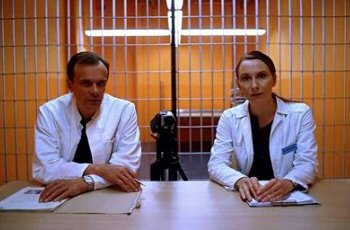das psychological fish
ok- this one really got to me.
(warning - there may be mild spoilers in this post)
the other night we watched das experiment(2001), a german film based (loosely) on a the infamous Stanford Prison Experiment - a psychological experiment done at stanford university in 1971. Where a group of volunteers (all students in the real experiment) were arbitrarily split into prison guards and prisoners, and then placed in a prison mock-up in the university in order to observe the effects of the prison system on "normal" psyches. the prisoners were to follow simple rules and the guards were to keep order - both the movie and the original study adhere to the basic question: "What happens when you put good people in an evil place? Does humanity win over evil, or does evil triumph?"
in some ways i'm glad that i got to see the movie prior to reading detailed accounts of the actual experiment because i was left with this feeling of "no, that couldn't have really happened - wouldn't human sense kick in?" which is probably what the director/author meant.
the experiment is set up, the different roles are assumed casually enough. at first, everyone seems content to just take it easy, collect their money in two weeks and go home. well everyone but our hero Tarak. Tarek Fahd, prisoner #77 (above: Moritz Bleibtreu of Run Lola Run fame), enrolls in the experiment in order to detail it for a magazine article. there was actually a "insider" in the original experiment, who thought that the experiment was set up to determine how best to control radical students (this was the early 70's remember), but that's about where the character diverges as Tarek proceeds to cause havok by provoking the guards and refusing to fall into the role of the "good prisoner" - there's always one, right? besides, the more out of control this experiment gets, the better the story - just like: the more over the top the movie the better, right? not so much. it certainly is intense but the timeline was a bit ridiculous: "how is it only the third day?" and the violence was pushed over the top.
the movie may incorporate many elements from the standford experiment but it is actually based on a book, "The Black Box", by german author Mario Giordano. it is fiction but so well done that i was calling out in shock as the experiment gets out of control. now, i'm not a very squeamish person but the movie brings to mind disturbing images of concentration camps (not the least because it's in german) and it seems likely that this was a parallel that Giordano as well as the director, Oliver Hirschbiegel (Downfall, 2004) wanted the audience to draw, as the guards were certainly dressed similiar and at one point in the movie a 'prisoner' yells "you nazi motherfucker!" at one of the 'guards'.
the experiment was supposed to continue for 2 weeks but was prematurely terminated after 6 days when the psychologist reveiwed tapes of the 'guards' being sadistic and "escalating their abuse of prisoners in the middle of the night when they thought no researchers were watching... Their boredom had driven them to ever more pornographic and degrading abuse of the prisoners." This quote comes from a slide-show account of the experiment written by Dr. Zimbardo, the psychologist in charge of the experiment and applies to the movie as well.however, this is not a documentary by any means. in the movie the main researcher inexplicably goes absent right before the 'guards' take over but what amazes me about the actual account linked above is that it details not so much the 'guards' behavior as the behavior of the stanford doc, himself, acting in the role of the prison super-intendendant in response to the experiment - caring more about the security of his 'prison' than the well-being of the 'prisoners', though the researchers did intervene a number of times.
the actual researcher complains there was no violence in his experiment and that the movie is misleading but this could partly be because he never goes into detail about what exactly was "pornographic and degrading" about the behavior of the 'guards' - however, the filmakers were forced to remove "...inspired by incidents that occurred during a psychological experiment at Stanford University, Palo Alto, USA" from the movie.
conclusion: the actual Stanford Prison Experiment is fascinating, the movie das experiment was intense and well done, if not entirely believable and i love german movies (something about actors and the language, which i kinda speak and kinda understand).
(one last comment: "Black Box" also refers to a book: Darwin's Black Box: The Biochemical Challenge to Evolution by Michael J. Behe)








5 little fish:
Read "Blindness" by Jose Saramago
I only read the first line and it looks interesting so I won't read the spoilers...
A UK TV channel tried to recreate the Stanford experiment a couple of years ago. It was very over controlled though and I doubt the results were what they expected - there were a couple of really strong characters amongst the 'prisoners' but all the guards were absolute doormats, so within 2 or 3 days it was running more like a commune or a kibbutz than a prison. Everything was shared, the cells were never locked. It was weird.
Hmmm, I've read articles on that experiment and based on what you said, it's a shame that they hd to overdo the movie action a bit. Seems like sticking to the true story (as much as they could) would have made it even shocking.
carl - ok i look forward to hearing your views on the movie as i recommend you watch it
anonymous - roger that
phylos - i wonder if the results were a cultural phenomenon, a temporal phenomenon or if they had more to do with the head researcher than the subjects - ah well we may never know, if nothing else it is a great background for a story
cat - yeah, i think i agree with you, even though the movie was great too, the experiment is more fasinating, though a movie that followed the experiment would have to follow the researcher instead.
Post a Comment
<< Home